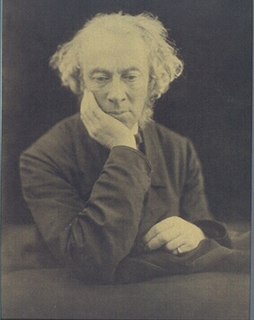A Quote by Robert Southey
Affliction is not sent in vain, young man, from that good God, who chastens whom he loves.
Related Quotes
God takes the most eminent and choicest of His servants for the choicest and most eminent afflictions. They who have received most grace from God are able to bear most afflictions from God. Affliction does not hit the saint by chance, but by direction. God does not draw His bow at a venture. Every one of His arrows goes upon a special errand and touches no breast but his against whom it is sent. It is not only the grace, but the glory of a believer when we can stand and take affliction quietly
The readiest way which God takes to draw a man to himself is, to afflict him in that he loves most, and with good reason; and to cause this affliction to arise from some good action done with a single eye; because nothing can more clearly show him the emptiness of what is most lovely and desirable in the world.
The man who has known pure joy, if only for a moment ... is the only man for whom affliction is something devastating. At the same time he is the only man who has not deserved the punishment. But, after all, for him it is no punishment; it is God holding his hand and pressing rather hard. For, if he remains constant, what he will discover buried deep under the sound of his own lamentations is the pearl of the silence of God.
We are to take no counsel with flesh and blood; give ear to no vain cavils, vain sorrows and wishes; to know that we know nothing, that the worst and cruelest to our eyes is not what it seems, that we have to receive whatsoever befalls us as sent from God above, and say, "It is good and wise,--God is great! Though He slay me, yet I trust in Him." Islam means, in its way, denial of self. This is yet the highest wisdom that heaven has revealed to our earth.
God, Who is by nature good and dispassionate, loves all men equally as His handiwork. But He glorifies the virtuous man because in his will he is united to God. At the same time, in His goodness he is merciful to the sinner and by chastising him in this life brings him back to the path of virtue. Similarly, a man of good and dispassionate judgment also loves all men equally. He loves the virtuous man because of his nature and the probity of his intention; and he loves the sinner, too, because of his nature and because in his compassion he pities him for foolishly stumbling in darkness.
The man who fears to be alone will never be anything but lonely, no matter how much he may surround himself with people. But the man who learns, in solitude and recollection, to be at peace with his own loneliness, and to prefer its reality to the illusion of merely natural companionship, comes to know the invisible companionship of God. Such a one is alone with God in all places, and he alone truly enjoys the companionship of other men, because he loves them in God in Whom their presence is not tiresome, and because of Whom his own love for them can never know satiety.
As a man of pleasure, by a vain attempt to be more happy than any man can be, is often more miserable than most men are, so the sceptic, in a vain attempt to be wise beyond what is permitted to man, plunges into a darkness more deplorable, and a blindness more incurable than that of the common herd, whom he despises, and would fain instruct.
Soul mates' are fiction and an illusion; and while every young man and young woman will seek with all diligence and prayerfulness to find a mate with whom life can be most compatible and beautiful, yet it is certain that almost any good man and any good woman can have happiness and a successful marriage if both are willing to pay the price.







































